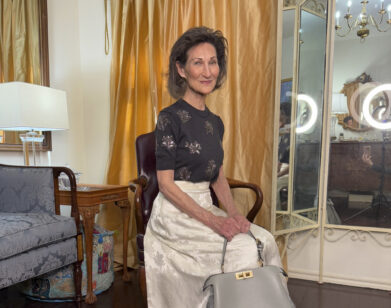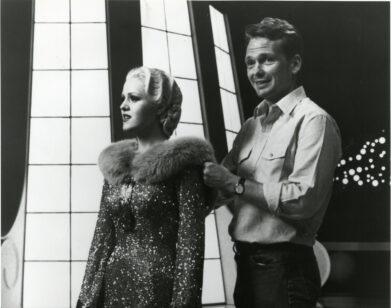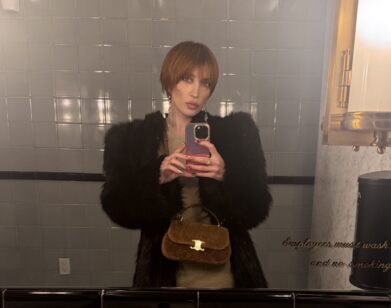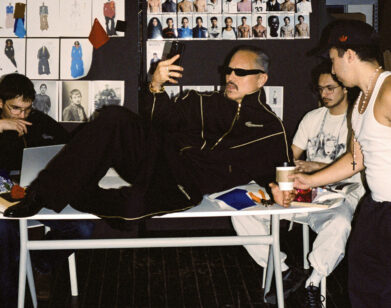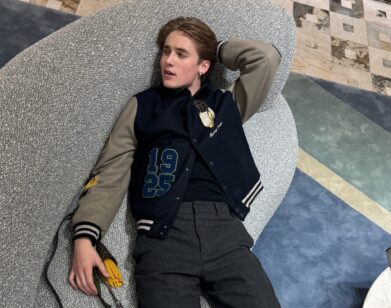Telfar Clemens Lets Stefano Pilati In On The New Luxury

All Clothing and Earrings by Telfar. Shoes by Converse x Telfar.
Telfar Clemens didn’t set out to change the fashion industry so much as he dared it to catch up. As the founder of Telfar, the Liberian-American designer effortlessly bends trends toward him, playing a crucial role in the proliferation of genderless clothing, inclusive casting, and the democratization of luxury apparel. A longtime fixture in New York’s multi-racial, LGBTQ+ creative underground, the Queens native was orchestrating pop-ups before they became a corporate marketing ploy. In 2017—the same year he was awarded the CFDA/Vogue Fashion Fund—his capsule collection with White Castle sent proceeds to fund the bail of minors at Rikers Island, setting the standard for socially conscious brand partnerships. And then there’s his ubiquitous Shopping Bag, which made its debut at the 34-year-old designer’s big-box-store-inspired A/W14 extravaganza at the New Museum in downtown Manhattan. The faux-leather tote, which features Telfar’s iconic logo etched on the front, has become a symbol of Clemens’s appeal: a high-low accessory whose status is defined by its accessibility. Taking a break from fashion in a small Italian town outside of Bologna, the designer caught up with his friend, the Random Identities founder Stefano Pilati, to discuss what makes them gag.
———
STEFANO PILATI: You have been very busy. Are you happy working in Italy?
TELFAR CLEMENS: I’m getting used to everything. In some ways, it’s a lot more intense. In others, well, there’s always the midday bottle of wine.
PILATI: I’ve always been obsessed with your logo, and I guess not many people know how you came up with it.
CLEMENS: What rumors have you heard?
PILATI: That you took it from a Liberian symbol or something. Is that correct?
CLEMENS: My logo is basically just my initials. I sort of got it from my elementary school teacher. I had to take this one program that’s basically ESL, where you get integrated into the English language and learn how to speak very American. I couldn’t understand what people were saying, and they couldn’t understand me. Basically, any time you would achieve some kind of goal, they would put points next to the logo of your initials. I’ve had it since kindergarten. I was constantly bored at school, so I’d always draw this logo next to a lot of the sketches of clothes I drew.
PILATI: That’s a nice story. How’s it been going since winning the CFDA/Vogue Fashion Fund?
CLEMENS: It was good to win, and the support that I’ve been getting from their establishment and the rest of American fashion is great. It’s nice to be given the chance, and I’m opening the door a little bit toward my goal of just doing what I do.
PILATI: I will say that it was about time.
CLEMENS: That was the first time I applied, to tell you the truth. I never wanted to be a part of that TV show [the reality show The Fashion Fund], and the first year that they got rid of the show was the year that I applied and I won. I can’t really complain about that. I got everything I wanted out of the situation, and now I’m interested in doing things in other places and really being a global brand rather than just an American brand. I’m always American, but there are really cool things going on in a lot of other places.
PILATI: Do you feel the pressure and the responsibility of being one of the future big brands in the United States? Didn’t you say that you wanted to be the next Michael Kors?
CLEMENS: Meaning, at the time, that every single person had a Michael Kors bag in their hands, even if they didn’t know what it was.
PILATI: Well, I have the big one you made, as you know. I was actually thinking about getting a very small one. I want it in black. I was at your show and that was the first time you presented the small one. We were just gagging.
CLEMENS: When we got the CFDA prize, the first thing we did was invest in the purse program so that we could make it at an affordable price, and at a large quantity, while also turning a profit.
PILATI: From what I see on Instagram and around New York, that bag is really symbolic. I see other bags that make aspirational statements, but yours is more about people loving you. Frankly, besides the fact that I like the bag, I actually love you. I think that everybody else does, too.
CLEMENS: It’s actually the entry point of the brand. There aren’t too many places where you can get a $100 luxury product.
PILATI: I’m not into expensive clothes right now.
CLEMENS: I am and I’m not. Anything that I have that was expensive has usually been given to me for free. I like the idea of a treatment, and the amount of workmanship that goes into it, that makes something expensive, but not the aspirational place that an item might take me. If you can get into that party because of that shirt, I probably don’t want to go to that party.
PILATI: Or wear that look.
CLEMENS: I want to go to the party where I don’t have to wear a shirt.
PILATI: How supportive is your community and how much do they challenge you?
CLEMENS: A lot of people in my group of collaborators started off as my friends. I’m lucky enough to have really talented, smart friends, and they’ve always contributed and added to the dialogue of what my work means, and what their work means in the world. We’re working together toward a common goal of enjoyment. Before there was any promise of money, a lot of my friends and collaborators just did whatever they were doing for me— just to do it and let it exist in the world. There wasn’t any other purpose.
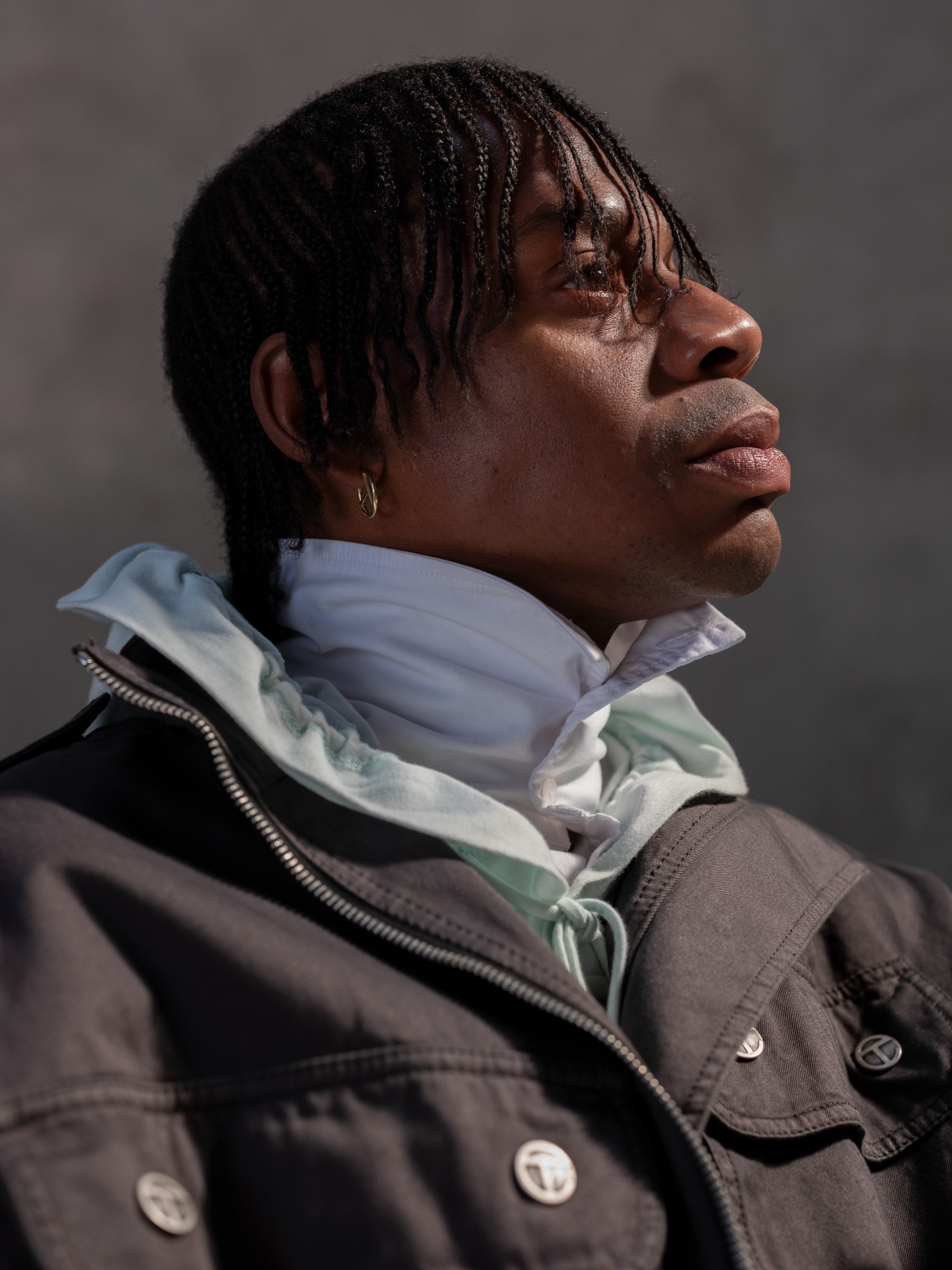
PILATI: Don’t you find it difficult to work with friends?
CLEMENS: I find it difficult to work with people who aren’t my friends. My friends have known me since I was 17 or 18, when we did the first show. They’re still continuing to work on the shows now, and advise me in the right way, and actually read me when I’m an idiot. Not too many people can do that.
PILATI: For me, it’s difficult when I have affection for the people around me because my work is very pragmatic.
CLEMENS: I get really attached to people as well, especially if I’ve been working with them for a while. You can understand when someone is your work friend and when someone is your life friend. It’s about limits, boundaries, and expectations. When people give feedback, it’s really usually my friends, people who really fucking care about this thing and who also want to make you gag at their performance. That’s a true friend.
PILATI: Am I wrong, darling, or have you not studied fashion?
CLEMENS: Never studied fashion. It’s a very African family expectation of “anything creative doesn’t make money.” I went to business school and I wanted to be an accountant, but then I was like, “I don’t know if I really want to watch other people’s money for them.” Also, I had already started the line. I started making clothes at, like, 15, so I never really had another job outside of making clothes. I sold a shirt, you gave me some money. I sold some jeans, you gave me some money. I also didn’t learn shit in college. I went to school at six in the morning right after the club, somehow aced every test, and then designed the line in the afternoon. I was on the dean’s list, but I don’t remember shit besides people’s personalities and the clothes I wore at the time.
PILATI: Why do you think that is?
CLEMENS: The line started during freshman year. People knew about what I was doing, at least a little bit because I sold clothes. I would sell them on the street. I met my first best friends, and suddenly all of them were wearing things that I had made. I knew it was going somewhere, and I didn’t want it to be interrupted by being taught by someone else. I’ve always felt that when people are teaching you, it means you didn’t really do it yourself. No disrespect to anyone who is a teacher, but I don’t really want to know. It’s so valuable working with people who actually went to fashion school because they know how to organize some shit. But when it comes down to things being taught about how to do stuff, I’d rather try it and fail, or succeed and know about it. Most things that I make I know about, and I don’t really try to know about most things.
PILATI: Just to be a bit bitchy here, what do you think about this late movement in fashion toward amateur designers?
CLEMENS: I can’t hate on anybody. I think fashion is a conversation. If you have a cell phone, you have an opinion about fashion—that’s the world we live in. At some point, I feel like every single person will be making their own fucking clothes. If someone can make some shit really good that you just can’t do at home, then you have to buy it. We might not even be working on a money system in 10 years. I know what I bring to the table and I know what you can and can’t do. I know there’s some shit that I’ve made that you can’t make. You would just be wasting a lot of time trying to do it.
PILATI: Where are you going for Christmas, darling?
CLEMENS: I think I’m going to be in your town, Milano. I think I’m staying here until Pitti happens. I’m going to be Italian, baby!
This article appears in the Winter 2019 issue of Interview magazine. Subscribe here.
———
Fashion Assistant: Gregory Miller.

